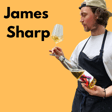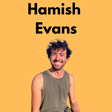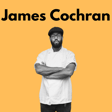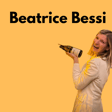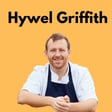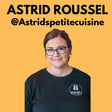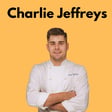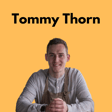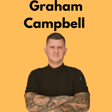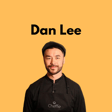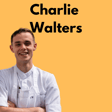Become a Creator today!Start creating today - Share your story with the world!
Start for free
00:00:00
00:00:01

#2 Mark Best - From Sydney to Netflix
Mark best is regarded as one of the best chefs in Australia, and today he talks to us about the twists and turns his journey took to get him that title. Mark appeared on the Netflix cooking competition The Final Table in 2018, where he and his team mate Shane Osborn took the competition by storm, by showing off their unique and thoughtful style of cooking.
Mark is also know for his flagship restaurant in Sydney, Marque, which he had for 17 years, and had the accolade of 3 hats (Australia's version of stars) Mark also talks to us about his time at Alain Passard's restaurant L'Arpege. Please enjoy, Mark Best.
Transcript
Introduction of Mark Best
00:00:02
Speaker
Well, welcome back to the Check On podcast. And on today's check, we've got a pretty special guest. Now, this guest is all the way over in Australia and is regarded as one of the best chefs there. You may recognize him from the Netflix cooking show and competition, The Final Table, where he got all the way until the end. Mark Best is a highly regarded chef with a playful and unique style of cooking and for 17 years had one of the best restaurants in Australia. So please enjoy Mark Best.
00:00:40
Speaker
And we are recording. Welcome to the Check On Podcast. We've got Mark Best on today. How are you going? Very well, thank you. Finally here. Finally. I think that was probably the toughest connection that I've had so far. So I'm sorry that that had to be you. You're not the first to say that.
00:01:01
Speaker
What's it like in Australia at the moment? Absolutely delightful. yeah about Making our listeners jealous. It's, you know, perfect one day and better the next. That's a little bit sad for us. I think this is our first sunny day we've had in a little while now. Whereabouts are you? You in Sydney? Sydney, yeah. not So well opposite ends. So just at the sort of towards the beginning of spring. So beautiful. last I'm coming back over in November and I can't wait. I'm dying for it. I'm going to spend a few days in Sydney and then tour around a little bit. Good. Well, let's so let's have a wine or something. and I would love to. That'd be amazing.
Mark's Culinary Journey Begins
00:01:43
Speaker
um So you you started off your career a little bit later. You started off at 25 in the kitchen, didn't you?
00:01:51
Speaker
I did, yeah. I was an electrician before that, so in the gold mines in Western Australia and then got out of there and went to work on the submarines in in Sydney for the Australian government refitting submarines as sort of an industrial sort of electrician and 25 I decided I'd had enough of all of that and big upheaval and went into the cooking world.
00:02:20
Speaker
That's crazy. I mean, even even at the start, working on submarines and stuff, like it was never just a you know ordinary electrician. It was always something a little bit different and a little bit big. I had aspirations to work above ground after the mines and found that I was unqualified. And so I ended up working on submarines, which even deeper, if you can imagine.
00:02:45
Speaker
Were you, so it wasn't just like working on them above ground. You were working on them while they were in the water. No, it wasn't the Navy. I was just just refurbishing them. But when you're down on that battery box that I'm doing night shifts, replacing all of the infrastructure and everything, it's, you know, and that actually I'm claustrophobic instead of, you know, working in the mines and in submarines. like so That's not a really good choice if you're claustrophobic. No, it's a pretty poor choice.
00:03:15
Speaker
It's still very interesting though. I imagine it's maybe a little bit more glamorous than what it sounds. No, not at all. No?
00:03:26
Speaker
So what what made you decide to go into cooking if you'd spent that much time doing sort of a different trade? I think I never really had a passion for it. As you know, this is a a career that's completely built on naivety and passion in equal measure.
00:03:49
Speaker
And so with that, like everyone else, I just decided that I was going to cook with no knowledge really that I was any good at it. um And obviously, this is pretty internet, pretty a lot of things. And you know I think I was watching things like Keith Floyd on television and, um, um, Old Mate from, uh, Rick Stein from Cornwall watching his first series. These sort of things, you know, on the ABC here, which is equivalent to your BBC and just going, oh my God, this, it just looked so vibrant and alive and exciting and, you know, they really captured the moment, sort of engaged me and, you know, sort of thought, oh, I'll have a go at that.
Exploring Influences on Australian Cuisine
00:04:37
Speaker
um what was your What was your first kitchen that you worked in then? I happened to be sharing a house with ah with a chef and she said, you know, before you sort of throw your life away completely, you know, why don't you try and come and spray out a day, you know, in the in the kitchen. So we went to Maclay strip Bistro and I think it was just like a lot of sort of lucky circumstance. And she turned out to be actually I didn't know, but a very good chef indeed. And the Bistro was one of the first sort of contemporary Australian bistros that started off as a French one. But it was really exploring what was
00:05:17
Speaker
I think what it was like to be an Australian restaurant in terms of its ingredients and all of the multicultural aspects of of Sydney, like we think have represented about 135 or seven different language and cultural groups, you know, and um all of those are represented in the market. So, you know, you can go along as a chef and and see all of these weird and wonderful ingredients. And, you know, a lot of maybe listeners don't know that Australia is actually geographically, you know, a part of Southeast Asia. It's easier to get to Bali or Indonesia than it is to get to the other side of Australia from Sydney. So, you know, so its it's in it's an interesting place. Yeah.
00:06:08
Speaker
I think when people hear how long it is to get from Sydney to Perth by flying, they just don't even comprehend how big Australia is. No, you're just better off going the other way anyway. Let's head north.
00:06:21
Speaker
But so I ended up in this, um in this, in this, yeah, Maclay Street Bistro. And it turns out, I was good at it. And at the end of the day, she said, you know, I do have a job, but it'll be back to the beginning as a sort of a first year apprentice. And so I said, yes, I'll take it. And I did another apprenticeship and then never looked back from that day. So it was just so incredible you know what it's like when you first walk into the kitchen you know and just looking it's just such an alien and yet in one way an alien environment but in other ways you know completely recognizable you know and you just wanted to know more and learn more.
00:07:02
Speaker
Yeah, I remember my first experience in the kitchen. I was training to be a familiar in front of house manager and um one of the apprentices won a competition and she went to France for a month and they asked me if I would cover for her. And I still remember my first day I had very basic tasks, but like the rush of service and how everything worked. It was, it was almost intoxicating.
00:07:24
Speaker
um And I begged them to let me stay. Once she finished her apprenticeship, I was like, please let me take her place.
00:07:32
Speaker
um And then you, so you've traveled quite a bit um from what it seems you really wanted to experience different things and hone your craft in different places, which took you over to Alain Passade's restaurant.
00:07:47
Speaker
and So I guess like once you start, once you start late, you know, you're in a bit of a rush, you know, as by 25, especially in those days, you know, and most chefs were, you know, burnt out, but started at 15 and were looking, looking like old men at 25, you know, say, but I'd started late. And so I guess.
Insights from France
00:08:08
Speaker
ah things were sort of starting to change in the industry. um I just know that I needed to learn more in Australia, you know, seemed sort of limited for me in those days. and with Valerie, my partner and wife, we decided to go overseas on a holiday and we went to France and just had picked up a couple of books and just became interested in it and we hired a little Citroen and drove all over France for six weeks and they had everywhere and sort of fell in love with regional French cuisine and
00:08:41
Speaker
One of those days we happened to go to Arpege and had lunch, the previous lunch, and just again it was sort of this this moment, you know, this ephemeral sort of moment that um really enraptured us and just decided that one day I would be coming back here and working here and so it took about another three years, three or four years, I think, for um eventually I got back there and worked with people like Maro Colorgreco and Pascal Babot and things, you know, the greats in their own right now. And it was, you know, pivotal moment in my career. From that day, I sort of knew where I needed to be in the industry.
00:09:25
Speaker
Yeah. That must've been a really crazy experience. Cause I know I felt similar. I started in the kitchen at 21 or 22 and you know, that was what 10 years ago now. Um, even then most people that were in the kitchen have been in there since they were 16, 17. And I really felt like I was sort of behind and very similar to you. I did my apprenticeship and I worked a year and then I was like, I have to, I have to get out of Australia. I have to experience everything as quickly as possible, um, to be able to.
00:09:53
Speaker
I had this sense of trying to catch up, I guess, almost. Can I go back to the bit where you're an Australian?
00:10:02
Speaker
I don't sound Australian anymore. No, you don't. No, sorry about that. I'm from Victoria, so I don't think we ever had, or I never had a super thick accent. My grandparents are from England and New Zealand, so that's that's my excuse, I guess, and I haven't lived there for six years, but um yeah. There you go.
00:10:22
Speaker
There you go. um What was it like working in op-ed? um was Arduous would be one word, the first word. Invigorating would be another. um ah think I think, you know, you're working sort of 16-hour days there, six days a week, and you literally
00:10:48
Speaker
I never felt, never really felt fatigued there, you know, it was just so exciting and just seeing that produce coming in the in the front door from from his farm up in the the north of France would come in by a tissue every day and then other things, all these artisanal sort of producers, you know, the ducks wrapped in pink tissue paper and the mushroom guy and someone else would bring in, you know, asparagus or morels or all of this sort of stuff that I'd only ever seen in books, you know, so for a young chef, it was just just incredible. You know, and obviously, I spent half of my time under the under one of the stairwells, you know, with on top of a rubbish being a board scrapping giro and things like that with the head to the side. But, you know, that was just
00:11:40
Speaker
Yeah. But it's one of those things that you love, isn't it? You don't even think about anything that's amazing. No, all of the recipes and the the people I met and I've sort of kept in contact with quite a few of them and, you know, say sort of camaraderie as well, you know.
00:11:59
Speaker
Yeah, things changed a little bit now in terms of the workplace, that sort of thing. and sort of you like You just threw your all at it, you know, and just knew that it was for a finite time. that I don't think physically it's possible to go any further, but it was is is incredible. and that there were sort of foundation sort of moments there that i still I still remember everything about it, you know the recipes, I don't need to look at recipe books, just sort of somehow sort of got locked in. you know and making
00:12:32
Speaker
making ice creams, you know, in the Capagiani machine and things like brushing up these little lollies called bellingo, which are from Provence, which are made out of pure and essential sort of citrus oils and making, crushing those up and making putting them into a crème anglaise and just churning to water.
00:12:52
Speaker
And then we would just roast peaches and orange juice and sugar freshly, these beautiful peaches, and that would be served with this lolly ice cream. So things like that are quite audacious, you know, but it just like really stimulated your imagination and I think allowed me to...
00:13:10
Speaker
I guess, explore my own culture once I got back because of the sort of, he was so audacious in his ideas and an arcana class, you know, in terms of French cuisine, he was doing something completely new. And and I just love that attitude.
00:13:29
Speaker
Yeah, I think, um, I think it's always been a restaurant that's a little bit ahead of its time. Um, while still using and respecting the products, but sort of being very, very creative and very bold and different in the way that they use them.
00:13:44
Speaker
It's still quintessentially French, you know, he was seen as sort of like, I guess, people like him, Pierre Gagne, Michel Brahe, Mark Brahe, those sort of people that I've admired were sort of a new generation and they were seen to be undermining the sort of the the French culinary oeuvre, you know, but they certainly now, like, they're still as relevant as they ever have been, you know, in turn, because they were just so... absolutely contemporary but while still still being French and it was just ended up being just all about the produce. Did working there give you a different appreciation for Australian produce? um In the sense that they they are very proud and protective over what they what they produce in France and sometimes I think in Australian restaurants we tend to forget that we have our own really cool things
00:14:40
Speaker
Yeah, I think that was things were changing were changing then. I mean, the lesson to be taken to be taken from that time was that. To be proud of what we had here, to be to be proud of what it is to be an Australian chef and our ingredients and our producers and help develop that and that, you know, important ingredients weren't better than our local ingredients. And so that became um I guess my sort of ethos in terms of Mark restaurant when when we opened it it was just to use everyday ingredients that anyone could buy and I thought that it was my role as a chef just to elevate those ingredients, you know.
00:15:24
Speaker
um rather than being exclusive or, you know, being gatekeeping, you know, tiny little radishes or, you know, getting the growers in to, you know, to just to do it for you, just to give you sort of an advantage. So I couldn't compete being sort of self-owned, so I just would buy ordinary things.
00:15:43
Speaker
um and elevate them and so those things like ordinary beetroot, big fat beetroot or big fat parsnips or ordinary carrots that you could buy at Woolworths for instance became our signature dishes. We did very different things with them so that really helped me develop develop my style and my voice in the industry.
00:16:05
Speaker
It's a big thing, I think, isn't it? I think it takes a little while to really develop your identity as a chef. Like I know for me, I'm definitely still figuring that out. Yeah. Decades, I'd say. If ever. Yeah, if ever. Yeah.
Opening and Evolving Restaurant 'Mark'
00:16:20
Speaker
So Mark was your, was your second restaurant. Is that right?
00:16:24
Speaker
Yes, yes, and a little bit stroke and that's we sold that to go to France and use the proceeds to go to France and and work lives there um and And we were not overseas for that long, about a year. We went then when we went to um went to Padstow to interview with Rick Stein, and we were going to work there, and then decided instead to go to work for Ramon Blanc at Le Catre Cezanne, up in Great Milton, up in the Cotswolds, which in the end I didn't particularly in enjoy. It was a bit militaristic, and I think in terms of what they were trying to achieve, it wasn't where I'd left at Apege, it was very different.
00:17:12
Speaker
and So yeah we just hung out there as long as we could and then came back and basically opened mark about I think or within the year once we got back. so And again, it it started off very modestly. It was just going to be like a small neighborhood bistro. And we just got a bit ahead of ourselves and the design got a bit flash ah and off we went. And then I had to rewrite the menu to fit the design of the front of house. And so suddenly we were sort of like a fine dining restaurant. So that was the plan. But you had the intention of opening it up as a bistro. Yeah. Yeah.
00:17:49
Speaker
How does that go from wanting to be a bistro to being an iconic three hat restaurant? I think in the back of my mind, I always wanted to be more, but I don't know. It just started that way. And I think as we were working through design and building the restaurant, I think our ambition had got away from us and decided that we would push a bit harder than just being a neighborhood bistro.
00:18:18
Speaker
Do you think you always, maybe in the back of your mind, expected it to be something great, but you said in your head it was going to be a bistro? And maybe if that's something from a therapist, I'm not sure. Fair enough. And then, so that was, that was open for quite a long time. I remember when I was sort of 17 years. Yeah, that's true. It's a really long time for a, for a three hat restaurant. That's incredible. It is. Um, it took a, yeah, it took a.
00:18:49
Speaker
a long time, a lot of work, a lot of the dedication. um And Valerie ran the friend of ours, I ran on the around the kitchen and I think that's why we're able to sustain it for so long. um And then about halfway through, I think we really started to get some real talent, some young talent started being attracted to the place. And it was from there that we're really able to build the team, you know, to go forward because you can't do anything just as, you know, as an individual, you you certainly you run out of ideas fairly quick and energy. So in the end, I just sort of store myself as being
00:19:30
Speaker
sort of a conductor of a very fine orchestra. And I sort of ah taught all of the all of the young younger chefs coming through to sort of think critically and think creatively, ah to work creatively, um which I think is ah is a technique. It's not some innate talent, you know, it's just a way of working and way of thinking. And in a way, our kitchen was seen as one of the hardest in Sydney and that wasn't because of the old ways of because it was abusive or violent in any way. It was because it was intellectually demanding. It took a long time for people to get anything onto the menu or if I asked for ideas, I expected them to give me fully fledged ideas, not the usual chef thing, you know. Yeah, for sure. That must have been a really incredible experience for the people that did come and work for you, though.
00:20:25
Speaker
Do you know what they've gone on to do afterwards? Oh, yeah. Dan Hong runs all of the Asian parts for Meravale Group, massive group now. Victor Leon has got a couple of hats in Melbourne and a place in Singapore. um We have Brent Savage runs a ah large restaurant group called The Bentley Group, all with the leads and in a very successful and terror.
00:20:55
Speaker
six penny Dan Puskas. He's another one runs a three-pack restaurant, a small one. So there's nearly ah nearly 10 of them that went on to be sort of leaders in their own right when they now have, you know, on the sort of, I guess, the the grandfather of it all now. So they've all got the, all the grandkids are now running out and the great grandkids. So the restaurant generation has turned over fairly quickly. But yeah, so I think that's the You know, I don't i don't like the word legacy too much, but the legacy of of Mark was that whole genre of young chefs that went out and did things in very different ways. They didn't emulate what we did, but they did. They certainly knew, learned how to sort of run a business, run a restaurant, run a team and and to work creatively. And I think that's, you know,
00:21:49
Speaker
I think that's a good thing to be able to teach someone, you know, I missed having an actual mentor, so I continue to sort of mentor, you know, quite a few of them, sort of come to me as, you know, for knowledge or my opinion or whatever, and I'm always interested in giving away or dispensing my advice, whether it's required or not, or asked for or not, I'll give it.
00:22:11
Speaker
yeah But that must be but must be um an incredibly proud thing for you. like Also, obviously having a very successful restaurant with high accolades for such a long time, but having the the students, I guess, for lack of a better word, that were under your mentorship to then go on and do such amazing things. And so many of them, you must be incredibly proud.
00:22:35
Speaker
Yeah, I don't dwell on it too much. um Being Australian, we have to be humble, as you know. and so We, yeah, don't dwell on it too much. I think it's it's nice it's nice that it happened that way. i'm i'm proud that I am proud that it happened that way.
Challenges and Closure of 'Mark'
00:22:53
Speaker
um it was It was quite deliberate. It was just the restaurant being an extension of yourself as a person and who you are. I think you know i've the restaurant reflected what I wanted to achieve. um At the end of 17 years,
00:23:08
Speaker
sort of had enough of that I think that type of restaurant sort of it's is so demanding I think you end up having to step away with it from it and it takes quite a long time to divorce yourself from the restaurant as an entity and extract yourself extract yourself as a person from it and define yourself in other ways other than just through the restaurant Was that a hard decision when you decided to close mines? Yes, very hard, yeah. but by that By that time it was not, ah for whatever reason, we lost our third hat and we couldn't litigate. I'm not going to re-litigate that. I don't understand why, but I thought that we were doing just as better than ever. Perhaps the third had got a little too intellectual for the customers and we'd left them behind, I guess.
00:24:05
Speaker
And then, you know, it wasn't it wasn't doing this well financially and we it really needed to refurb or reinvigorate some way, usually with vast quantities of cash required for that type of thing in this industry. And I just didn't, couldn't justify it any anymore, you know, for 20 years before, you know, to start a restaurant like that, it didn't cost that much, but later on it was cost a significant amount. I just didn't think that the financial,
00:24:34
Speaker
viability was there to do that so just decided to get into consulting and I was doing other things at that stage. I had bistros on board, luxury cruise liner and three of them and that sort of thing so it allowed us to get out of it but so yeah.
Consulting for Luxury Cruise Lines
00:24:50
Speaker
So then what was the next step for you once you decided to close Mark?
00:24:56
Speaker
I had, I was on board the Drude cruise lines, which is a brand new cruise line and I don't think Bistro is in the gun and trained a lot of stuff. Went to Bremerhaven in northern Germany and they built brand new ships and trained up all the stuff from scratch.
00:25:14
Speaker
There were enormous ships. um There was 2,800 crew on board and 700 of them were in seven hundred were in the F&B section. And so that's a small village in itself, you know, just the crew and the pack that the ship could take on 5,000 passengers fully laden.
00:25:37
Speaker
and then we had sort of a hotel within a hotel so we were in the sort of like the upper decks. There were 19 floors and we had the upper decks and that's where my bistro was which is sort of like the luxury end of the thing and so we just did a lot of work with being brand new vessel and a brand new line in terms of training and development and one of the things I was proud of was being able to establish lines of supply out of Australia into Hong Kong, Beijing, and Singapore um for the ships, which is quite difficult, but we did it. So being able to have, you know,
00:26:15
Speaker
Oysters from Bateman's Bay come in live into Hong Kong and then being able to, you know, shuck them fresh and that sort of thing on board was amazing. All the Australian beef, which is easier obviously, but fruit and vegetables and all that sort of stuff that I just sort of defined myself by as a chef, you know, to have those ingredients around me was very comforting on board. That must have been a huge task to set up getting all of that produce over and over.
00:26:43
Speaker
Yeah, there's a lot of work, so it's very involved for three years and that that went on very well until COVID and then everything sort of everything fell apart and the line collapsed and was sold off and broken up and so that was it. and so to then went into a bit more ah consulting work and a few years ago helped open a brand new Ritz-Kalton in Melbourne, which is amazing, and c incredible, incredible property, and then moved on.
00:27:21
Speaker
from there and now I'm consulting up at the Colau Hotel in Brisbane, which is I think number 12 in the 50 hotels in the world, best in Oceania and I do the F and&B consulting. So that incredible, you know, luxury boutique hotel. So I've sort of got to develop a lot of experience over over the decades in terms of working at that level in terms of luxury branding and all of that sort of stuff and working with that level of clientele as well. So I have that experience. It was a good fit.
00:28:01
Speaker
Are you enjoying sort of the new line of your career then, rather than being sort of tied to a restaurant, being able to help develop other people's identities? Yeah, 100%. Yeah. The only issue with consulting is that, you know, they employ you for your expertise and then don't listen to you. that and suddenly But nothing changes. I feel like that's how it goes.
00:28:25
Speaker
Yeah, but I'm doing a lot a lot of things, a lot of the skills I learnt as a small restaurateur, you know, like marketing and PR and I say photography predated even in my restaurant or even my electrical career I learnt in high school, learnt photography and I still do that and so now even part-time working for a ah PR company and and doing copywriting and for websites. or
00:28:58
Speaker
photography for clients in terms of um their social channels and writing coffee for that. Do other things like writing sort of value statements and brand pillars and things that have sort of learned to do everything to save it sort of steps and all different you know hotels or there often be operations can really define and understand who they are.
00:29:24
Speaker
um and articulate that. And you'll find, if you ask any, you ask many of your colleagues or or restaurants, what do you do here? What's this about? And it's a really struggle to articulate who they are. And but it's extremely important. So that's part of part of what we do in terms of the consultancy as well, in terms of really help people define who they are and what they're about and what's their competitive advantage against in a very crowded market. So it's very important to understand that and and you know but you know why why should people come in through your door and sit at your table? If you can't tell them, then as the customer are going to know,
00:30:10
Speaker
It is a very hard thing to define though sometimes. like I know when we opened up our own very small company, um we were very stuck on that for a minute. you know When we were doing all the designing and the concepts and you know the question came up, well, who are we? What do we do? Why do we do it? um It's definitely somebody else's full-time job, the whole marketing and identity. It takes sound some consideration, doesn't it, to work that out.
00:30:38
Speaker
and And once you do, and once you do it it's it's helpful. it It sort of drives all other aspects of your business. Yeah, I think that when you when you really think about it, it is a really, really critical point of, like you said, an oversaturated market, letting people know why they should come to you. And why you're better.
00:31:03
Speaker
It's a hard question though. I think, yeah, I think if anyone were to ask me why our business is better than the next one, it would take a little bit of thought and consideration to think about that. Yeah. And you have to get over the the feeling of, you know, that you're blowing your own trumpet, you know, and just yeah and just be able to clearly articulate your comparative advantage to the others around you.
00:31:30
Speaker
You mentioned that um COVID obviously sort of put a halt to some of your operations. I haven't been back to Australia really um since COVID. How do you think COVID has changed the industry in Australia? I know my opinions on what I think it's done in the UK, but what do you think it's done in Australia?
Impact of COVID-19 on the Industry
00:31:49
Speaker
Well, first thing it did, and you would have noticed that in the UK, the US, even Europe, I think it completely flat-lined celebrity, the celebrity chef. I think that it's really struggled to...
00:32:04
Speaker
come out of um out of COVID, I think people in this crisis went back to their roots in terms of they start, you know, in terms of the crisis, they start nesting. They want to go back home to home, half family, ah simple things, gardening, you know, that sort of, it's, and that's what's happened, happened in Sydney, other than the sort of, I guess, the financial carnage, ah but certainly conceptually the restaurants
00:32:34
Speaker
a very, I guess, they were forced into maturity in terms of cooking a less ego-driven offering. um And the kitchens had to clean up their act culturally as well, because they were having to employ a lot of people that weren't actually, you know, used to a kitchen the kitchen environment. So especially younger women and younger younger people coming into the kitchen, they just would not put up with the the shenanigans of the past um and so got the whole culturally the whole thing has changed and I think it's all the better for it in terms of the restaurants that are surviving now ah sort of seem to be more relevant to their customer base, more delicious, more everyday, better value, less ego, a bit more humble.
00:33:27
Speaker
Yeah, I think that we noticed that over here as well. Um, cause we only arrived in England in 2020, October, 2020. So it was sort of right in the thrifts of it. But I think that obviously there's a lot less people in the industry at the moment, which I think gives the employees the, the advantage almost, because there's not that you can't have that bully mentality or that real sort of rough kitchen mentality. Cause people just won't stick with it.
00:33:53
Speaker
and well your You also had Brexit as well, so you know you lost a lot of the lifeblood of the industry, which is a lot of that that immigrant force.
00:34:05
Speaker
um pretty much the same thing happened here like when COVID came down all the temporary visa holders were just let go and the industry hasn't really recovered so there's a lot of short term visa holders here you know that were basically told to go home and they but sort of break that trust with Australia that Australia is always going to look after them and they've gone home and sort of dribbling back now it's getting a little bit better but it's been incredibly difficult. Yeah I think it's been a hard time for a lot of industries.
00:34:41
Speaker
But the saturation, you know, the restaurant industry looks after itself, the saturation continues. Those those that survived COVID, and barely survive, probably got too much debt. They're sort of starting to shatter their doors. And then but the new people are coming along and using that as an advantage for the next wave of ah restaurants. And, you know, Sydney is as vibrant as it's ever been now. It's really Melbourne. Melbourne is struggling still.
00:35:09
Speaker
ah for whatever reason. They did it longest and hardest during COVID, and they're still struggling to break out of that. The old CBD hasn't really recovered, whereas ah Sydney is as vibrant as it has it's ever been, and, you know, wonderful place to come and die and drink, you know. It's more outdoors now, all that back-land thing that Melbourne had the advantage of. I think Sydney has sort of taken that, and, you know, you'll find small bars everywhere I live in, Darlinghurst near King's Cross. and don't even need a car anymore. You can walk around and have you know it's like living in a sofa or something. you know so That's amazing. What are your places that you love going to at the moment?
00:35:50
Speaker
Just small places. I just went to a little pop-up last night, like 50 metres from my place. and people um Some some Basque people have just started with this little pop-up and they've bringing this new line of conservation, this incredible anchovies and sort of those sort of barnacle clams and all this sort of stuff. and which came up during all these businesses that happened in Spain during, you know, these conserves, like all chefs started counting their own dish, sardines and everything, and it's just really incredible quality and I think the wine industry in Australia is... incredible as you know and that's changed and so people are like the natural wine movement has sort of improved so we've got rid of all the the funky unpalatable stuff and it's just really vibrant and juicy and delicious and just stuff that you just want to drink and eat every day.
00:36:51
Speaker
that When I come back to Australia in November, I'm bringing my partner, who I met in Australia, he's French, and I'm also bringing his parents. And um they're very, you know, true, proud French men and French women. And I'm really excited, but also a little bit scared to show them new world wine. So hopefully, hopefully they enjoy it as much as I do. I'll i'll point you in the right direction.
00:37:15
Speaker
Please, please. We've got four days in Sydney, so I'll be looking.
The Final Table Experience
00:37:20
Speaker
So pre-COVID, it was 2018, I think it was, you went onto the final table, and which I've only just watched now thinking it was a new TV show. But what what made you want to do that?
00:37:35
Speaker
oh I had nothing better to do and I was asked. and so yeah so It was an amazing experience. so um going to We were um put into the soft hotel in West Hollywood for seven weeks to film that that series.
00:37:54
Speaker
um As you know, no spoilers, but as you know, some didn't stay like that long. but
00:38:02
Speaker
Anyway, yeah it was an it was an incredible, it was an incredible show. So I'm not going to give you the results. so A lot of people haven't watched it still, even after all this amount of time, but it still sort of keeps popping up as ah as a popular cooking show. And I still get an incredible amount of love on yeah Instagram, people saying, you know, thinking I speak Spanish or whatever, and writing to me in Spanish. and It's just sort of, it's translated all over the place. so My Instagram feed is sort of a bit warped, so I've got a massive fan base in Peru and Brazil and all these sort of places. Columbia is another one. um But, you know, it was it was it was great. It was just a really fantastic platform to you know test our skills. I mean, I've worked with my partners, you know, with Shane Osborne, another fellow Aussie from
00:38:57
Speaker
Earth so he was very well known to me in terms of the editor where he had two Michelin stars, first Aussie to get one Michelin star and then the first Aussie to get two Michelin stars in London so he was very famous back in the early 2000s and so is our combined it really required our combined experience to get through that through that show. It wasn't without putting any I mean in negativity but like MasterChef is different to MasterChef in that a lot of the MasterChef contestants go on there with no professional experience but this is we were professionals and so we didn't have stylists looking at our plates or anything it was like everything was done in real time so there's there's a lot of pressure.
00:39:48
Speaker
Did you know, so you knew of Shane before or you knew him personally before you went on together? I knew him personally. He was the first one cast and then he chose me, I think. So I could have chose a partner.
00:40:04
Speaker
um which was great and gratifying for me. um But yeah, it was good. And then we went through this incredible, incredibly arduous casting process with having to talk to the production assistants, many, many Zoom calls, and and then psychologists and had to do online psychological tests and another one when we got up there. And then um We basically had twice as many contestants as required and we went and did another test in the studio. And then we were loaded into two vans and one van went one way to the airport and the other van went back to the studio. i Yeah. Yeah. So it was pretty hardcore. That did sense. Yeah. Wow. The ones that went through the studio must have been really relieved.
00:41:01
Speaker
Yes, we were.
00:41:06
Speaker
So we won't say how far you how far you went through. but No, we won't. You did very, very well. yeah Absolutely. i um I remember when I first started watching it, I was so excited to see you and Shane on there. I was i couldn't believe it, because i honestly, I knew nothing about it. um And then when I were doing the introductions, I remember hitting my partner in the leg being, oh my God, do you realize who is on here? And he, of course, nobody in France, I think, especially not him, knows a lot about Australian chefs with me. I was so excited. um And I was really sort of excited to see what you two would come up with together in terms of your dishes and your concepts. And I just remember thinking how different they were to to a lot of people. you You both had your own very sort of unique
00:41:54
Speaker
style. And I think that really, really showed for me something that I was really, you really proud of for you guys as well. It's quite interesting how well this the style stood out in terms of, I guess it's just an openness to ideas as being isolated here, you've had to sort of like adapt and make up a lot of stuff. And so you end up coming up with a very different way of doing things.
00:42:20
Speaker
I think the one that stood out for me the most or that I remember the most was the um the Thanksgiving dinner. I thought that concept was so bold and a little bit risky, but they loved it. what What made you sort of think about that and how much time did you have to come up with that concept? 24 hours prior to that, we'd come up with a concept and it was a bit having a laugh as well, you know,
00:42:49
Speaker
was about having a laugh humor, as you know, was a very big part of our part on there. And we were just having a laugh, you know, it's taking the piss almost the Thanksgiving turkey burger. So others did it more and more traditionally, we thought, well, why not? We'll just we'll just put the whole of Thanksgiving into a burger.
00:43:07
Speaker
and so obviously technically it was actually quite difficult to do it in that amount of time in that we made you know had to bone a turkey put it through the mincer had to put a stuffing in it put cranberry stuff that with cranberry sauce so we like racing against the clock trying to get these things in the blast chiller and frozen down and making cranberry sauce and I've even made um We made sides as well, I think I made like candied yams and we made our own cranberry marshmallows all in an hour, you know, so it was like, right, you had to like really plan it.
00:43:45
Speaker
and no spirit that's not That's not a long time, 24 hours to come up with, you know, really cool and unique concepts and then even less time to have an hour. And, you know, I sort of know what it's like. You've got them coming up and wanting to interview you and, you know, sort of realize how much of your cooking time that takes out. yeah That must have been really sort of intense.
00:44:10
Speaker
i think it it's I think it was like you know spending a couple of decades working pretty creatively anyway, so it wasn't difficult for me to come up with those ideas. I've got far more ideas than I ever am able to execute, but having someone like Shane there to like go, you just you just spoke the same language. you know so we were able to go, okay, this is the idea. And he would either push back or I would push back and we'd come up with a pretty sharp idea. And we, I guess we had this camaraderie that we really didn't need to speak too much to each other during the, during the cook, not have to explain to each other what, what was happening or what was doing. We're just like looking and no knew exactly where we were. So that was fantastic.
00:44:59
Speaker
Yeah, I think that probably gave you a really big competitive advantage as well. You know, when you would watch YouTube cook, like you said, you, there wasn't a lot of explaining or talking. You would just look over and see where the other person was at and be like, okay, well now I need to be here. Um, some of the other contestants, I think they had to have a lot of communication to kind of pull that off.
00:45:18
Speaker
Um, it was, it was beautiful. It's like watching the, you know, when you're having a busy service and it's just one of those amazing services where it's almost like a dance, everything is going perfectly. I think that's what I felt when I was watching you two cook together on the program. It was, it was something beautiful, I think. Well, that's the best of the industry, isn't it? Those nights.
00:45:41
Speaker
just few and far between. So we tend to we tend to hold on to the negative ones and more than we do the positive ones, as you know. 100 grateful customers and one one asshole and we'll always think about the asshole for the next three days. Why do we do that? I wonder if every other industry does that, but we always do that. um And then I wanted to sort of point out, I read in, I did quite a bit of reading up on you,
00:46:12
Speaker
Um, I read in one of your interviews, you said talking about sort of being a chef in Australia. We do not have the shackles of culinary history. We are free to be inventive, spirited, adaptive and progressive. And I think that's one thing that really kind of sums up the best of Australian cuisine to me. How would you describe Australian cuisine? It's a question I get quite often and I'm always a little bit unsure how to answer it.
00:46:41
Speaker
um Well, I wrote that passage. Where have you got that from? I wrote that. So that's that's part of my description of what it's like to be an Australian chef.
00:46:53
Speaker
um I, as a Sydney chef especially, I think it's if
00:47:01
Speaker
about what we eat as much as anything. It's it's those 135 different language groups and cultural groups that live and work and dine and open restaurants and grow in in Australia that we're able to use. And it's embracing embracing all of that. And we are what we eat as chefs. So I think my I think my biggest advice, no most valiant advice to young chefs is to go out and eat as much as they possibly can. It's more educational than reading books and sitting on Instagram or, you know, sitting in, you know, doing thousands of hours like eating, eating out is instructional. And so you end up just putting the together all of these ideas. You can't be, help it be,
00:47:53
Speaker
influenced by your environment and I always think that it's really hard to define what Australian cuisine is because there's so many variations on it depending where you are but there is there are cultural differences obviously as you know between Melbourne and Sydney and Brisbane and Perth and Adelaide. Hard to pick if you're foreign a foreigner but you know you certainly know as an Australian you know the variations in accent and approach and attitude i mean But I always think it's it's when we go away from Australia, like you spend two weeks in Spain and you go, oh my God, I want to get back and have some of that touch of Asian, that touch of that acid that sold, you know, that heat that we're used to um that sort of up and down, you know, as the the nuance black and white that we have in Australia, you know, I think.
00:48:49
Speaker
It's stranding cuisine is very light and bright and fun. We don't take ourselves too seriously. and But still, um that's allowed others to perhaps not take things as seriously as well. But we certainly have a very, very defined style and idea of what Australian food is. And it's really it's really about the relationship between awesome us and the grower and fishermen and having access to this abundance of produce, I think really de defines who we are. I'm going to have to save that answer for the next time somebody asks me.
00:49:28
Speaker
Um, it's pretty all' all over the place, but anyway, with I like it. Um, just going back to final table for a second. What was your, what was your most memorable moment there? I think like.
00:49:50
Speaker
one of the ones like that feeling when you had your first win you know like say that we had first the taco or whatever it was you know and i remember seeing like the actual Mexican chef I forget his name is but getting getting knocked out in the first round and I'm thinking oh my god he's not going to live this guy if he goes home being knocked out in the taco challenge but um yeah I just I just remember remember that that has been a big win and that sort of like sort of set us set us on our course forward um I think also
00:50:27
Speaker
We just love the camaraderie of, you know, as you know, like working with all the people, the production crew and all of the different chefs and just being all together, you know, you said you really bonded with them and the the companionship was fantastic and sort of stand a nice and forged a deep sort of then long friendship through that but process, which was wonderful.
00:50:53
Speaker
Yeah, I think it's, um, it's one of the things that struck me the most about MasterChef was I went in there expecting it to be a highly competitive environment, but in a bad way, almost where it was really sort of catty and competing against each other. Um, but it was the exact opposite of that. And it sounds like that's what it was for the final table. Yeah. hundred to percent yeah yeah It all very, really positive and awesome.
00:51:19
Speaker
Yeah, even with the crew, I think, um, with the casting crew and stuff like that, you really do get quite close to not just the other contestants. It was, it was a very cool experience. So now that you've been through the final table, um, we've gotten through COVID, what's, what's in the future plans for you?
Future Plans and Reflections
00:51:38
Speaker
I don't know. I'm always asked if another restaurant is on the the table. i'll I'll never say no, but it depends on what the on what the offer is. um We'll see. ah Hopefully a bit more travel. I'm going to actually cook and In November, I'm going to Tewa, which is a symposium that's going to be in Calgary. And so I'm going to visit Darren McLean, who's from the show. So we're going to cook a dinner at his new restaurant, Eight, and which seats eight people, which is going to be amazing. so
00:52:15
Speaker
um He's actually coming to London soon as well, so I'll i'll break that here. I don't think he knows that, but he's going to open up in the middle of London somewhere, I think, around Mayfair, I'm not sure. but um So he's going to be living in the UK for a few years. So your podcast, first on your podcast. I'd love to get him in. Get him in.
00:52:38
Speaker
100%, you should reach out to him. sir and Yes, I'm going to doing that. A bit more, a lot more consulting, I think. Helping out a couple of friends who are doing a huge build up in Brisbane. They've got a multi-layered sort of precinct.
00:53:01
Speaker
Middle Eastern tie to a French brasserie and then a sort of fine dining seafood restaurant so I'm helping them put that together. So again helping them write menus and recipes and sort of work out what it is and then keep all the chefs in line and keep them on on track. It's the hardest part I imagine. It is yes yes correct the width.
00:53:28
Speaker
Well, thank you very much. On this podcast, we have a little bit of a finishing tradition. um So I wanted to ask you, is there one thing that you wish sort of the general public knew about the restaurant industry?
00:53:45
Speaker
um That it's not a public service. Yep. That's a good one. I like that one.
00:53:58
Speaker
Very much. Well, thank you so much for coming on. um slipp pleasure Good evening. I'm going to go have some breakfast, I think. I'm going to go and cook a chip for dinner.
00:54:10
Speaker
Delightful. Delightful. Well, hopefully we get to speak again. It was really, really lovely to be able to meet you and speak to you. So thank you for taking the time to come on here. Yeah, please. We'll have that glass of wine. So don't forget to let me know when you come in and I'll show you around my hood. Yeah. Please. Awesome. Lovely to speak to you and we'll talk again soon. You too. Thanks a lot. Bye.


